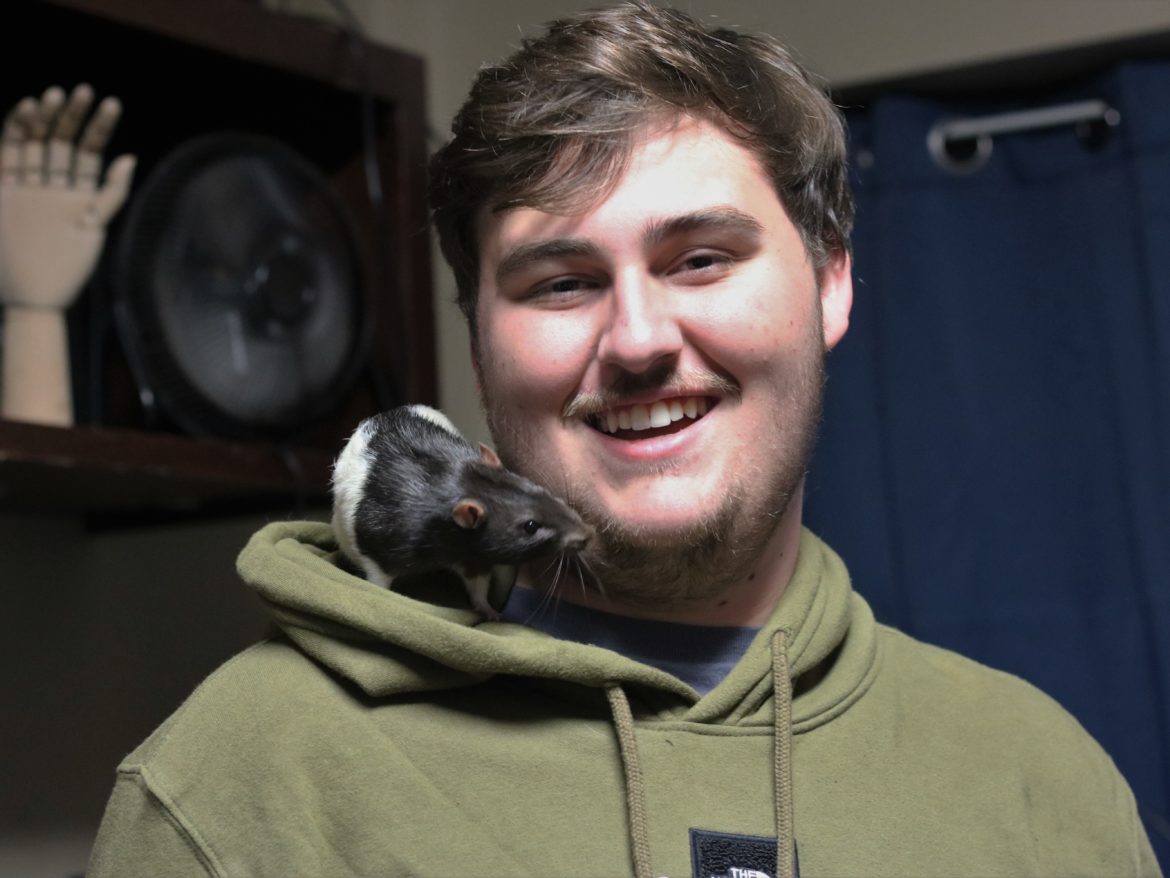Written by Ben Evans // Photo by Balazs Balassa
Room 102 of Harbin Hall is home to a very special resident. Freshman Jack Thompson lives in 102, but it’s his roommate that everyone wants to see. When he goes to the tailgates, everyone gathers around to see him. When standing outside for a fire drill, everyone wants to make sure he’s OK. Thompson has even answered knocks on the door in the middle of the night to find guests waiting outside to meet him. Thompson’s roommate, Edmond, may be the most famous resident currently living in Harbin Hall, because Edmond is an emotional support rat.
After the passing of his family dog, Thompson wanted to own a new pet.
“I was looking into snakes,” Thompson said “And then I was like, ‘How much does it cost to feed a snake?’ Because you have to buy them rats, right? Then I started Googling rats, and I was like, ‘These guys are pretty cool.’ The day I went to look at them in the pet store, there was only one, and I felt so bad for him that I bought him.”
Thompson bought Edmond last November for $10. When he was nine months old, Edmond moved with Thompson from Beaumont, Texas, to Harding University.
If Edmond isn’t in room 102, one can probably find him on Thompson’s shoulder. Whenever he wears hoodies, Edmond likes to sleep inside his hood and scamper back and forth along his arms. Edmond loves people, and he loves his owner. Any time Thompson calls him —“Eddie!”— Edmond scurries out from wherever he is hiding, hoping to get a treat. He loves sleeping, and he can often be found lying in one of the tiny hammocks in his cage.
According to Bridget Smith, director of the office of Disability Services and Educational Access, to get an emotional support animal (ESA) approved, students are required to provide details about how their disability or diagnosis impacts them in an on-campus residential setting and how their ESA addresses related barriers. Also required is a letter from the student’s licensed mental health provider that explains how the diagnosis impacts them in a residential setting, along with recommendations for accommodations that include the need for an ESA.
“We have an extensive ESA guideline policy which outlines the various expectations of the owner and animal,” Smith said. “Not all animals that individuals with a disability rely on meet the definition of a service animal for purposes of ADA [Americans with Disabilities Act].”
Smith encouraged students to use the website adata.org for further information regarding ESAs.
Like any support animal, Edmond has a job, and he is constantly on duty. His job is to de-stress Thompson. Whenever he has problems or concerns, he talks out loud to Edmond.
“Eddie will just be leaning on the cage, sniffing the air and listening,” Thompson’s longtime friend, freshman Michael Bliss, said. “He doesn’t give any feedback like a human … but just having someone there … really helps Jack.”
Thompson finds that feeding Edmond, filling his water and cleaning his cage help him stay motivated.
“It’s hard to keep yourself in bed all day if you have to keep another thing living,” Thompson said. I“If I enter into some sort of episode, it’s good to have something that [I] have a responsibility for. It helps to keep me focused and moving.”
Edmond’s fame has spread beyond the Harbin first floor. After all, telling someone that there is “a rat in Harbin Hall” never fails to warrant a reaction.
“Pretty much any time someone hears I have one, they want to see him,” Thompson said.
He often finds himself answering the door to strangers or being approached by people who want to meet Edmond, witnessing the same reactions almost every time, Thompson said. Initially, people are shocked to see him or even scream.
“Every time they freak out … and then they’re like, ‘Can I touch him?’” Thompson said. And then he crawls on their arm and they’re fine. … Either that or they won’t go near him at all.”
While he may be a small creature, Edmond is loved by his owner and brings joy to many who meet him or are brave enough to let him scurry along their shoulders.
